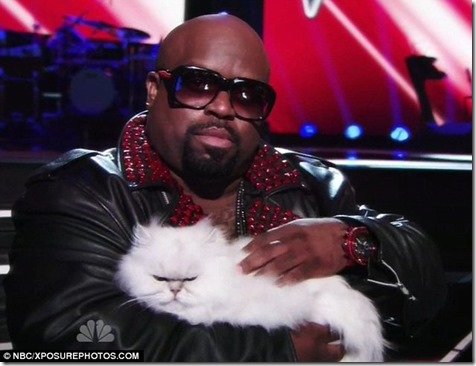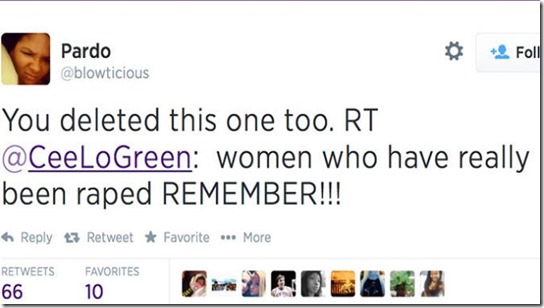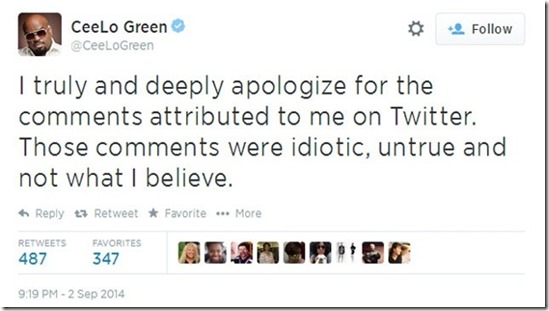Should You "Get Approval" For Tweets During A Crisis?
By now, you may have heard about the controversial tweets Cee Lo Green—the Grammy Award-winning singer and former host of NBC’s The Voice—sent after pleading no contest late last month to a disturbing charge leveled against him.
According to MTV, Green “entered a plea of no contest for the felony count of furnishing a controlled substance of MDMA/ecstasy to a woman without her awareness during a dinner in 2012.” MTV’s report continues:
“According to the Los Angeles District Attorney’s Office, Green slipped the drug to a 33-year-old woman while the two were at a restaurant…the woman, who hasn’t been named, alleged that she woke up to find herself naked in bed with Green in her hotel room.”
Green would have had enough of a challenge restoring his reputation after pleading no contest to drugging a woman and being accused of rape.
But the tweets he sent last week—particularly the one below that Green quickly deleted but other Twitter users shared—turned a tough crisis management issue into a career-threatening one:
In this tweet captured by BuzzFeed, Green reinforced that view, appearing to suggest that a woman who is drugged cannot, by definition, be raped.
Green later apologized, but in a manner that tried to distance himself from his words (the comments weren’t “attributed” to him—he made them).
Green has paid a heavy price since this controversy erupted. His reality show on TBS, The Good Life, was canceled. He was also removed from the lineup at a Louisiana music festival and from another concert sponsored by the U.S. Navy.
All of that gets me back to the headline of this post, which asks this question: Should you “get approval” before tweeting or posting to social media when you’re immersed in a crisis?
By approval, I don’t mean that you have to obtain approval from some central authority, but rather that you form a voluntary agreement between yourself and someone else—a manager, an agent, a spouse, a trusted business partner—that you won’t post anything on social media until you receive and consider their feedback.
Had Green done that, any manager, agent, or partner should have had the sense to tell him to sign off and walk away for a while. Instead, he tweeted in the heat of emotion, when his rational brain didn’t prevent him from compounding his original acts of terrible judgment.
My suggestion for those who find themselves in crisis mode? Don’t post anything to social media without seeking the opinion of a trusted ally first.
Cee Lo doesn’t have to listen to me. It’s just too bad he didn’t listen to his own lyrics from his hit song “Crazy”: “Think twice, that’s my only advice.”
Like the blog? Read the book! The Media Training Bible: 101 Things You Absolutely, Positively Need to Know Before Your Next Interview is available in paperback, for Kindle, and iPad.







The issue here is that Twitter is much like in-person conversation. We just say what we are thinking at the moment. People who just blurt things out in conversation and on Twitter without considering their impact are not people who think to check it out before they push send. That’s why Twitter is so “dangerous” for so many. They just don’t understand that Twitter, although similar to in-person conversation, records your thoughts and amplifies them
Hi Brad,
I was most interested in your analysis where you said that his tweets took a “tough crisis management issue into a career threatening one.”
I don’t necessarily disagree with you; however, I wonder why the initial charges and his plea of no contest to drugging a woman (the MTV report you quoted also implies some sexual activity took place) were not sufficient enough to be considered career threatening.
I even note some of the headlines announcing that he had been dropped from concert gigs reference his tweets rather than the charges. It’s almost as if to say, the charges weren’t serious enough to cost him a job, but his horrible tweets were. Another headline said Cee Lo “shocks” with rape tweets following charge. As if drugging a woman wasn’t shocking enough!
Perhaps the reason in this instance is that the Tweets were taken as confirmation of what happened that night, which reinforces the point that he should have had some sound advice before posting on Twitter. But, if the goalposts are shifting to where someone’s reputation is impacted more by what they say on Twitter rather than by the crimes they commit, I think we should all be concerned.
Brett —
Thank you for your comment. You raise a terrific point.
This is one of those not terribly uncommon situations in which what should happen and what does happen aren’t necessarily the same. Perhaps it’s a sign of our jadedness as a culture, but I’m not sure allegations of sexual assault or rape are necessarily enough to destroy a career anymore. Witness Mike Tyson, who’s made a stunning comeback as a movie star and pop culture icon; Woody Allen, who has continued to pipe out one movie per year, often to critical acclaim and box office success; and Charlie Sheen, who has assaulted numerous women but has continued his lucrative acting career.
Should credible rape allegations be enough to destroy a career? Of course. But judging as a dispassionate observer, it’s rather obvious to me that they far too often present little more than a short-term setback. I don’t disagree with your final comment — that should indeed concern us all.
Thanks for writing,
Brad
Wow, what brilliant PR person told him to say “sorry for comments ATTRIBUTED to me.” They were not attributed, he actually said them!
Oops, read too fast, you said this.